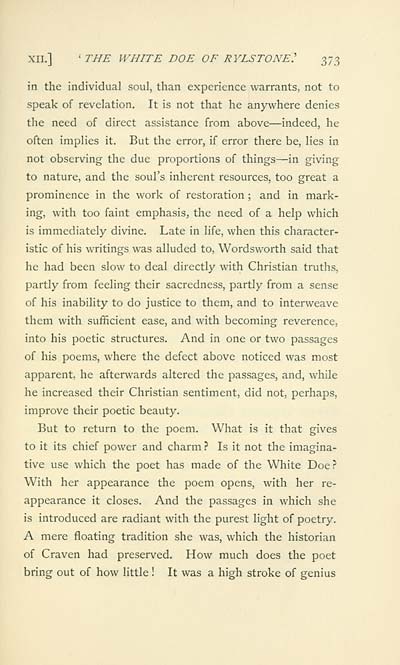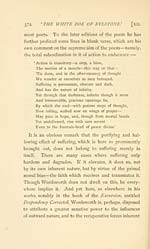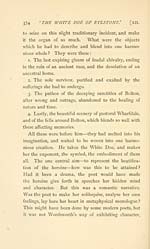Ossian Collection > Aspects of poetry
(389)
Download files
Complete book:
Individual page:
Thumbnail gallery: Grid view | List view

XIL] ' THE WHITE DOE OF RYLSTONE: 373
in the individual soul, than experience warrants, not to
speak of revelation. It is not that he anywhere denies
the need of direct assistance from above — indeed, he
often implies it. But the error, if error there be, lies in
not observing the due proportions of things — in giving
to nature, and the soul's inherent resources, too great a
prominence in the work of restoration ; and in mark-
ing, with too faint emphasis^ the need of a help which
is immediately divine. Late in life, when this character-
istic of his writings was alluded to, Wordsworth said that
he had been slow to deal directly with Christian truths,
partly from feeling their sacredness, partly from a sense
of his inability to do justice to them, and to interweave
them with sufficient ease, and with becoming reverence,
into his poetic structures. And in one or two passages
of his poems, where the defect above noticed was most
apparent, he afterwards altered the passages, and, while
he increased their Christian sentiment, did not, perhaps,
improve their poetic beauty.
But to return to the poem. What is it that gives
to it its chief power and charm ? Is it not the imagina-
tive use which the poet has made of the White Doe?
With her appearance the poem opens, with her re-
appearance it closes. And the passages in which she
is introduced are radiant with the purest light of poetry.
A mere floating tradition she was, which the historian
of Craven had preserved. How much does the poet
bring out of how little ! It was a high stroke of genius
in the individual soul, than experience warrants, not to
speak of revelation. It is not that he anywhere denies
the need of direct assistance from above — indeed, he
often implies it. But the error, if error there be, lies in
not observing the due proportions of things — in giving
to nature, and the soul's inherent resources, too great a
prominence in the work of restoration ; and in mark-
ing, with too faint emphasis^ the need of a help which
is immediately divine. Late in life, when this character-
istic of his writings was alluded to, Wordsworth said that
he had been slow to deal directly with Christian truths,
partly from feeling their sacredness, partly from a sense
of his inability to do justice to them, and to interweave
them with sufficient ease, and with becoming reverence,
into his poetic structures. And in one or two passages
of his poems, where the defect above noticed was most
apparent, he afterwards altered the passages, and, while
he increased their Christian sentiment, did not, perhaps,
improve their poetic beauty.
But to return to the poem. What is it that gives
to it its chief power and charm ? Is it not the imagina-
tive use which the poet has made of the White Doe?
With her appearance the poem opens, with her re-
appearance it closes. And the passages in which she
is introduced are radiant with the purest light of poetry.
A mere floating tradition she was, which the historian
of Craven had preserved. How much does the poet
bring out of how little ! It was a high stroke of genius
Set display mode to: Large image | Transcription
Images and transcriptions on this page, including medium image downloads, may be used under the Creative Commons Attribution 4.0 International Licence unless otherwise stated. ![]()
| Early Gaelic Book Collections > Ossian Collection > Aspects of poetry > (389) |
|---|
| Permanent URL | https://digital.nls.uk/78389940 |
|---|
| Description | Selected books from the Ossian Collection of 327 volumes, originally assembled by J. Norman Methven of Perth. Different editions and translations of James MacPherson's epic poem 'Ossian', some with a map of the 'Kingdom of Connor'. Also secondary material relating to Ossianic poetry and the Ossian controversy. |
|---|
| Description | Selected items from five 'Special and Named Printed Collections'. Includes books in Gaelic and other Celtic languages, works about the Gaels, their languages, literature, culture and history. |
|---|

